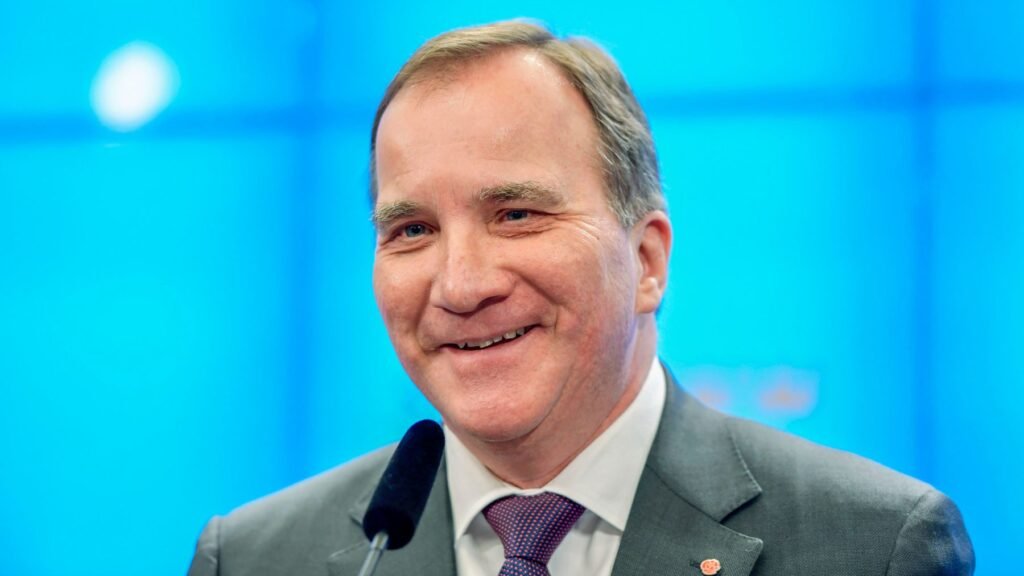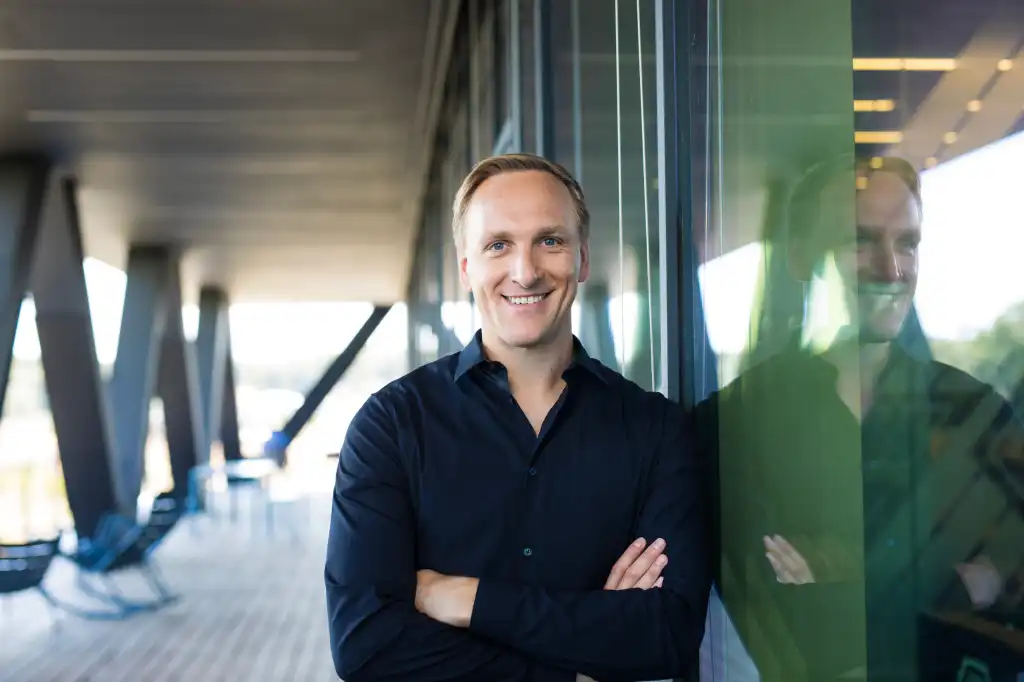Stefan Löfven is a well-known Swedish politician who served as the Prime Minister of Sweden from 2014 to 2021. He was the leader of the Swedish Social Democratic Party, one of Sweden’s major political parties, which focuses on social equality and the welfare state. His time as Prime Minister was marked by efforts to improve Sweden’s economy, tackle unemployment, and address issues like immigration and climate change.
| Full Name | Kjell Stefan Löfven |
| Date of Birth | July 21, 1957 |
| Place of Birth | Stockholm, Sweden |
| Nationality | Swedish |
| Political Party | Swedish Social Democratic Party |
| Prime Minister of Sweden | 2014–2021 |
| Spouse | Ulla Löfven |
| Occupation | Politician, Former Union Leader |
| Net Worth (2024) | $5 million |
Net Worth of Stefan Löfven
As of 2024, Stefan Löfven’s estimated net worth is around $3 million to $5 million. This wealth primarily comes from his salary as a politician, along with various benefits and pensions that come with high-level government positions. Löfven’s income has been stable due to his many years of service as a leader in Swedish politics. Though politicians in Sweden earn less compared to other countries, their salaries are respectable, and Löfven’s long career contributed significantly to his wealth.
| Year | Net Worth (USD) |
|---|---|
| 2014 | $2.1 million |
| 2015 | $2.3 million |
| 2016 | $2.5 million |
| 2017 | $2.7 million |
| 2018 | $2.9 million |
| 2019 | $3.1 million |
| 2020 | $3.3 million |
| 2021 | $3.5 million |
| 2022 | $4 million |
| 2023 | $4.5 million |
| 2024 | $5 million |
Sources of Income
Stefan Löfven’s income comes from various sources, which have contributed to his net worth over the years:
- Prime Minister’s Salary: As the Prime Minister of Sweden, Löfven earned a substantial salary. Swedish Prime Ministers earn around $220,000 to $240,000 per year, depending on bonuses and allowances. This was his primary source of income during his years in office.
- Government Pensions and Benefits: After leaving office, Löfven is entitled to government pensions. High-ranking officials in Sweden receive pensions after retirement from public service, which can be a steady source of income. These pensions are part of the reason why Löfven’s net worth has remained stable even after leaving the Prime Minister’s office.
- Income from Public Speaking and Consultancy: Since stepping down as Prime Minister, Löfven has been involved in various speaking engagements and consultancy work. Former leaders like him are often invited to give speeches at international events and offer their expertise in matters related to politics, governance, and economics. While there are no exact figures available, such activities can contribute significantly to his earnings.
- Book Deals or Memoirs: Although there is no confirmed publication of a memoir or book by Stefan Löfven, it is common for former Prime Ministers to publish books about their time in office. If Löfven were to do so, it would be another potential source of income, as political memoirs often sell well, particularly in Sweden and other European countries.
- Union Benefits and Former Career: Before becoming Prime Minister, Löfven was the head of the IF Metall Union, one of Sweden’s largest labor organizations. He likely accumulated some savings and benefits from his long career in the trade union, which adds to his net worth.
Early Life
Stefan Löfven was born on July 21, 1957, in Stockholm, Sweden. He had a difficult start in life, as his biological mother could not care for him, and he was placed in a foster family at the age of 10 months. His foster parents raised him in a small town called Ådalen in northern Sweden, where his foster father worked as a lumberjack, and his foster mother was a caregiver.
Löfven grew up in a working-class family, and these early experiences shaped his political views later in life. He attended local schools but never went to university. Instead, Löfven trained to be a welder, a practical skill that allowed him to enter the workforce.
Professional Life
Stefan Löfven began his professional career as a welder in a small company. This was his first job, and he worked hard to earn a living. His experience in the industry gave him a deep understanding of the challenges faced by ordinary working people. His real journey into politics started when he became active in the Swedish Metal Workers’ Union.
Career in Trade Unions
Löfven joined the trade union movement, where he rapidly gained attention for his leadership and commitment to workers’ rights. In 2005, he was elected as the chairman of IF Metall, one of Sweden’s largest trade unions. Under his leadership, the union fought for better wages and working conditions for its members. His ability to lead and negotiate with both workers and business owners prepared him for larger roles in politics.
Political Career and Rise to Prime Minister
Löfven’s entry into mainstream politics began in 2012 when he was chosen to lead the Swedish Social Democratic Party after its previous leader resigned. This was a major turning point in his life, as he was now tasked with preparing the party for the national elections.
In the 2014 general elections, under Löfven’s leadership, the Social Democrats won the largest share of votes, although not a majority. He managed to form a coalition government and became the Prime Minister of Sweden. Löfven led the country for two terms, until 2021, making significant contributions in several areas:
- Economic Growth: Löfven’s government worked hard to stabilize Sweden’s economy, focusing on reducing unemployment and investing in infrastructure. The country experienced moderate growth during his time in office.
- Welfare and Social Services: His administration increased funding for schools, healthcare, and elderly care. Löfven strongly believed in social equality, and much of his policy focused on ensuring that all Swedes had access to high-quality public services.
- Climate Action: He was an advocate for climate change policies, making Sweden one of the leading countries in Europe for reducing greenhouse gas emissions.
- Immigration: One of the most challenging periods of Löfven’s time as Prime Minister was the European migrant crisis in 2015. Sweden took in many refugees, and Löfven’s government faced significant debates about how to manage immigration and integrate newcomers into Swedish society.
In 2021, Löfven stepped down as Prime Minister, handing over leadership to a new generation within the Social Democratic Party.
Personal Life
Stefan Löfven is married to Ulla Löfven, and the couple has a close relationship. Ulla is also involved in the labor movement, working in IF Metall, the same union where Löfven started his career. The couple does not have any children but leads a quiet and private life outside of the political spotlight.
Löfven has been praised for his down-to-earth personality, a characteristic that many Swedes find relatable. Even as Prime Minister, he never distanced himself from his humble roots, and this is reflected in his policies that focus on the welfare of the working class.
Achievements
Throughout his career, Löfven has had several notable achievements:
- Leading Sweden as Prime Minister for Two Terms: Being able to serve as the head of government for almost eight years is a significant achievement, considering the complex political environment in Sweden. Löfven managed to maintain support despite various challenges, including a minority government.
- Boosting Employment and Economy: Löfven’s government successfully reduced unemployment in Sweden during his tenure. His focus on job creation, infrastructure investments, and vocational training programs helped many Swedes find work.
- Climate Leadership: Under Löfven’s leadership, Sweden remained a leading country in the fight against climate change. His government set ambitious targets for reducing greenhouse gas emissions, and Sweden continues to be a model for other countries.
- Handling the Migration Crisis: Though controversial, Löfven played a crucial role in managing the European migrant crisis. He implemented policies to integrate refugees and worked to ensure that they had access to education and work opportunities.
- Support for Gender Equality: Löfven’s administration was also known for its efforts toward gender equality. His government had an equal number of men and women in ministerial positions, and he promoted policies that focused on equal pay and parental leave for both mothers and fathers.
Retirement and Future Plans
After stepping down as Prime Minister, Stefan Löfven has maintained a relatively low public profile. However, he remains active in certain political and international forums, especially those focused on climate change and social democracy.
Though he no longer holds public office, Löfven has expressed interest in continuing to work for causes close to his heart, such as social justice and labor rights. He is expected to remain a respected figure in Sweden and internationally for his contributions to public life.
Conclusion
Stefan Löfven’s journey from a humble upbringing to becoming Sweden’s Prime Minister is an inspiring story. With a net worth of around $3 million to $5 million, his wealth comes primarily from his time in office, pensions, and speaking engagements. He has achieved much in his career, from boosting Sweden’s economy to fighting for climate change and managing immigration challenges.







